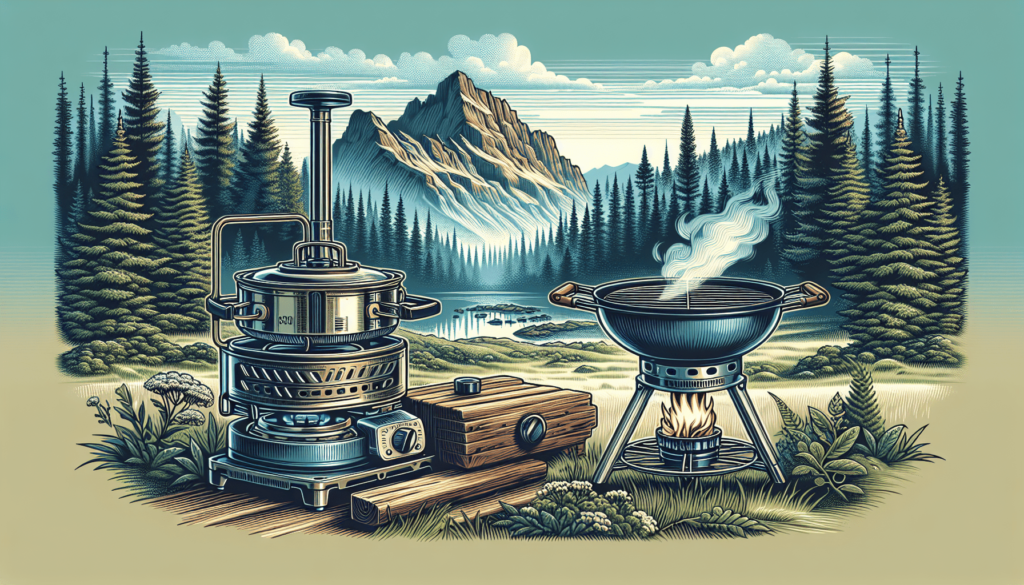Have you ever found yourself deep in the woods, ready for a hearty meal, and faced with the classic dilemma: camping stove or grill? When it comes to the culinary side of our outdoor adventures, the camping stove and the grill each have their unique roles, benefits, and drawbacks. As we traverse this topic, let’s uncover the subtle roar of both and discover which might be the best for our next expedition.

The Heartbeat of Our Campsite: The Camping Stove
Why Choose a Camping Stove?
Selecting a camping stove can feel like opting for the heartbeat of our campsite. Compact, portable, and often more versatile than most anticipate, a camping stove ensures we can whip up meals with precision and speed.
How Does a Camping Stove Work?
Most camping stoves use fuel canisters, either propane or butane, to generate an adjustable flame. This mechanism is incredibly user-friendly, ensuring even those of us who are not culinary experts can cook efficiently in the wild.
The Pros of a Camping Stove
Let’s break down the key advantages of bringing a camping stove along:
| Pros | Details |
|---|---|
| Portability | Lightweight and compact, making it easy to carry anywhere. |
| Versatility | Suitable for boiling water, making coffee, and cooking a variety of dishes. |
| Control | Adjustable flame ensures precise cooking temperatures. |
The Cons of a Camping Stove
Every silver lining has a cloud. Here are a few limitations we should consider:
| Cons | Details |
|---|---|
| Fuel Dependency | Requires fuel canisters, which can run out unexpectedly. |
| Size Constraints | Typically limited to smaller pot and pan sizes. |
| Weather Sensitivity | Wind and cold can affect performance. |
The Campfire Classic: The Grill
Why Opt for a Grill?
A grill evokes a sense of tradition and community. The sizzle, the char marks, and the flavors can transport us to memories of cookouts past. Grilling in the great outdoors can offer a culinary experience that’s both primal and deeply satisfying.
How Does a Grill Work?
Camp grills can be fueled by charcoal, propane, or even wood. The idea is to cook food over an open flame or hot surface, giving it that distinctive grilled flavor that we love so much.
The Pros of a Grill
Why might we want to bring a grill on our next camping trip?
| Pros | Details |
|---|---|
| Flavor | Imparts a unique, smoky flavor to food. |
| Capacity | Often larger cooking surfaces are ideal for feeding groups. |
| Versatility in Fuel | Options for charcoal, propane, or wood, depending on preference. |
The Cons of a Grill
However, there are a few challenges we might face when using a grill:
| Cons | Details |
|---|---|
| Portability | Generally bulkier and heavier than camping stoves. |
| Setup Time | Requires more time and effort to set up and maintain. |
| Fuel Weight | Charcoal or wood can be heavy and cumbersome to carry. |
Comparing the Camping Stove vs. Grill: Key Considerations
Cooking Variety
If we love gourmet cooking, a camping stove may serve us better with its ability to handle pots and pans of various sizes, perfect for soups, stews, and even frying. On the other hand, the grill is phenomenal for meats, vegetables, and anything that benefits from direct heat and those tantalizing grill marks.
Ease of Use
Stoves usually win this round for their straightforward setup, often lighting with a simple twist of a knob and press of a button. Grills, particularly those using charcoal or wood, demand more effort in ignition and maintenance.
Clean-Up and Maintenance
After a long day hiking or exploring, ease of clean-up can be a lifesaver. Camping stoves tend to be easier to clean, usually requiring just a quick wipe down. Grills, however, can be messier, with grates needing to be scrubbed and ash disposal to be managed.
Environmental Considerations
In our ongoing effort to be conscientious campers, we should consider the environmental impact of our choices. Utilizing wood or charcoal grills can be less eco-friendly due to the smoke and residue they produce, compared to the cleaner-burning propane or butane stoves.
Safety First: Handling Our Camp Cooking Equipment
Safety Tips for Using Camping Stoves
- Stable Surface: Always place on a flat, stable surface to prevent tipping.
- Ventilation: Use in well-ventilated areas to avoid inhaling fumes.
- Fuel Storage: Store fuel canisters away from high heat and open flames.
Safety Tips for Using Grills
- Fire Safety: Keep water or a fire extinguisher nearby.
- Supervision: Never leave the grill unattended, especially in windy conditions.
- Proper Disposal: Ensure all coals and ashes are completely extinguished before disposal.

Conclusion: Making the Final Choice
So, where does that leave us? The decision between a camping stove and a grill hinges on our personal preferences, the type of meals we plan to prepare, and the specifics of our camping trip. If we seek versatility and easy operation, the camping stove might be our best friend. Alternatively, if taste and tradition hold sway, setting up a grill could be the highlight of our culinary camp experience.
In the end, both tools have their unique roars, subtle and loud, each promising a delightful journey for our taste buds. Let’s pack mindfully, cook safely, and enjoy the heartwarming meals that make our outdoor adventures truly memorable.



